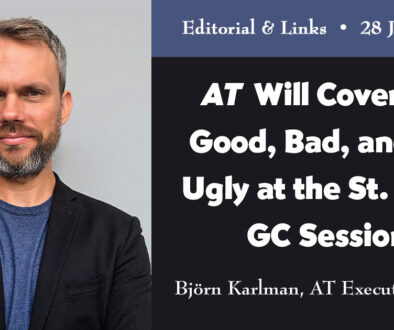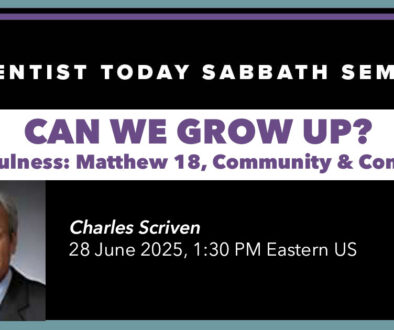A Health Odyssey
By Debbonnaire Kovacs, submitted May 6, 2015 Tom McClure was working in Romania around 2000, as a project manager and trainer for a program he defines as “essentially helping further the establishment of civil society organizations serving children and furthering democracy—helping de-institutionalize children.” The program was funded by USAID, through America’s Development Foundation and a 501 (c) 3 McClure helped to set up, called Support Centers International.
McClure had long-term health issues including weight and hypertension problems, and he was having a hard time. His driver “had joined the Adventists, so he turned into a missionary on my behalf and wanted me to visit one of their doctors. I was interested in getting updated approaches to management of hypertension, etc, so I went. I don’t remember her name, but that was the first time I ever visited a doctor who used prayer as part of the consultation! I thought that was pretty cool; whatever worked, that was my approach. I still remember one thing she said: ‘Milk is for calves.’ That was news to me, that I had to cut back on milk.”
With this doctor’s help, McClure was able to reduce his medication and still feel better. He also visited an Adventist health center, not to stay, but just as a visit. He says it was a “very active and well-attended place.” He was particularly interested in the vegetarian food services. His driver was vegan, and in fact, McClure reports that “Romania has a very substantial group of people who have been vegans, historically. And they [this group] mostly don’t cook the food, either. Most people don’t realize that.”
When McClure returned to the United States, after working in Romania, Egypt, and several other countries, he learned that his medical issues revolved around metabolic syndrome, which he defined as a combination of factors—waist over 40 inches, high triglycerides, high cholesterol, high sugar—which endanger one’s life.
“But you just get a pronouncement. You don’t get a suggestion of what to do about it—just change your life, right? In five easy steps…! So I thought of the Adventists and said, maybe they have something beneficial.” He reports that he had to do a lot of research, and that several people helped him find a Complete Health Improvement Program (CHIP) in Alexandria, Virginia, where he was at the time. It was a 30-day program at a church, and was already in progress. “So I called and asked if could join, and they let me in.” The program, McClure recalls, was run by volunteers with the help of CDs, two or three days per week, which included a vegan meal and consultation with a volunteer Adventist doctor.
“It was the first time I ever heard about non-ovo and non-lacto—those were strange words to me. The meals provided by the volunteers were really quite nice, and the programs included study about nutrition, exercise, lifestyle repercussions of your choices, and so on. By three weeks in, I had lost 12 pounds and when I went back for bloodwork, my triglycerides, sugar, and cholesterol were way down, though the weight was still high. This was a big change for me. I didn’t eat meat, or chicken, or cheese, so it was really pretty radical. But the results were there. So I was very pleased with it.”
In the course of time, McClure returned to Egypt, and this is where a good story takes a surprising turn. McClure told his co-workers about the CHIP program and said, We really need this program here!” He says people in Egypt were “dropping like flies from heart attacks and strokes because of the invasion of American fast food. Egyptians just went wild for that stuff.”
So McClure contacted Canadian nurse Linda Aahn, and Adventist nurse/nutritionist Joyce Neergaard, (who also holds a Doctor of Public Health from Loma Linda University), and said, “Let’s start a CHIP program.”
McClure brought the materials he had been given during the program and they put together a program that was adapted and implemented in Egypt, with medical tests and analysis, food preparation education, learning through CDs, similar to the CHIP McClure had attended, and they “got very good results. People with bad eyesight from diabetes improved, blood pressure came down; it was pretty much the same results as in the U.S. I’d say about 150 people benefited from it over two years.”
When I asked how they had adapted it, McClure said they made it “less academic and more hands-on. I thought U.S. program was lecture-heavy.”
The results are still going on; the original series has mutated into a program that’s now being operated by Dr. Neergaard, called Lifestyles for Wellness. They even put together Nile health cruises, with all the education and nutrition plus massage, since Dr. Neergaard was also a professor of massage, McClure says.
Concurrent with all that, McClure reports, the Adventists had finished developing a health center. In fact, Dr. Neergaards had been the director of the center, but now has her own practice. The health center has a gym, lecture hall, and kitchen and offers what McClure called “standard Adventist programs on health education. The Adventists also have a food factory which is utilized in the program.
McClure says he got the program started out of selfish reasons. “It was certainly helpful for me! When I was back in Egypt, I thought, ‘I need to continue this!’ And if I wanted to do it, I’d have to start it. It was lucky that we had two highly qualified, experienced nurses. They were the ones who adapted the program. It worked out well for a couple of years. I worked as volunteer there. But it never made money; it always cost more than it brought in, which affected sustainability. Still, in some ways it’s still going on.”
McClure was in Egypt when President Mubarak was removed “and all that turmoil.” After Morsi was elected, he says, “Egypt just didn’t function well—there was not much of a government. I’d been there for two revolutions, and I didn’t want to stay for a third. So I came back to the states.”
But, as he had learned before, sticking to a radical new regimen was a lot harder without support. He continued to be very impressed by Adventist health education. So he explored Wildwood Lifestyle Center. Back in the 1970s, he had worked in Georgia, and had passed the sign a lot: Wildwood Sanitarium in those days. “I thought it was mental hospital!”
Having learned it was a lifestyle center, McClure went there in November of 2014 for an 11-day residential program which he calls “the mother of all programs,” which includes the food, the exercise and physical activity, the education and cooking, and a large spiritual component. He pointed out that it is quite expensive–$4000, as he recalls, and although Wildwood has qualified for some insurance reimbursement, it’s not much. He says it was useful, but again, the issue is integrating those approaches recommended into one’s life after you leave! He reports that some things have held—he no longer drinks milk, he eats very few eggs, he’s reduced salt intake. And, he says, “One’s taste does change. Eggs taste awful now. They taste like feathers!”
This is a story without an end. McClure is no longer plagued by metabolic syndrome, but he still struggles to integrate what he has learned into an ongoing lifestyle change that will result in lasting good health and a healthy weight. Perhaps he will find a group of likeminded people who are all trying to accomplish the same thing.



